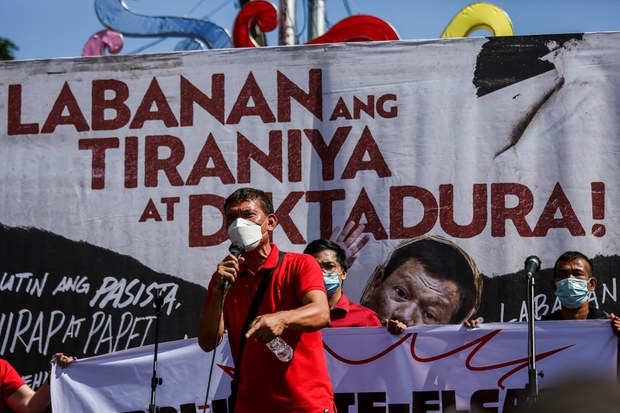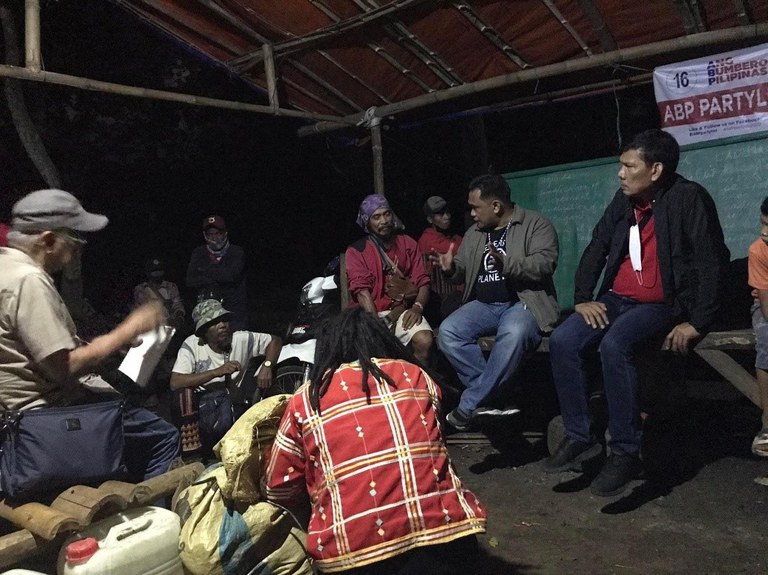Labor leader-presidential candidate caught up in shooting incident in southern Philippines
2022.04.19
Cagayan de Oro, Philippines
 Labor leader and 2022 presidential candidate Leody de Guzman speaks during a protest to mark the 73rd International Human Rights Day, at the University of the Philippines in Quezon City, Metro Manila, Dec. 10, 2021.
Labor leader and 2022 presidential candidate Leody de Guzman speaks during a protest to mark the 73rd International Human Rights Day, at the University of the Philippines in Quezon City, Metro Manila, Dec. 10, 2021.
Updated at 7:48 p.m. ET on 2022-04-20
Leody de Guzman, a labor leader and Filipino presidential candidate in the May 2022 general election, along with two senatorial hopefuls survived unscathed after gunmen fired at their group Tuesday as they met with indigenous farmers in the southern Philippines.
Several other people were reported injured in the shooting incident in the village of San Jose in Bukidnon, a province on Mindanao Island.
De Guzman, a 62-year-old activist who is a familiar face at labor-rights rallies in the Philippines, was meeting with leaders and members of the Manobo-Pulangiyon tribe to discuss how they could reclaim their ancestral lands in a land dispute, when gunfire erupted. Shots can be heard in a Facebook live-streaming video of the event, where people are seen scampering and taking cover.
“Thank you to those who were concerned for our safety,” De Guzman said afterwards in a message on Twitter. He and his two companions, Senate candidates Roy Cabonegro and David D’Angelo, were unhurt in the incident, he said. D'Angelo later posted the video on his Facebook page and urged people to disseminate it (see a clip from the video below).
“The one beside me who was hit was Nanie Abela, a farmer organizer in Mindanao. A leader of the Manobo-Pulangiyon tribe was also a casualty,” De Guzman said in Tagalog.
De Guzman said the gunshots lasted about 10 minutes as he and the farmers lay on the ground for cover. When the firing ended, he and the rest of his party and the farmers stood up and got out of the contested land.
While De Guzman was not deliberately targeted in the shooting, Tuesday’s incident marked the first time that a presidential candidate was shot at in the Southeast Asian country.
Later in the day, CNN Philippines reported that at least 5 people were hurt in the shooting.
Philippine National Police spokeswoman Col. Jean Fajardo said the incident in San Jose happened at half past noon, when a group of tribal petitioners, including De Guzman and his companions, allegedly forced their way onto private property, provoking a confrontation with security guards.
“The security personnel fired a warning shot to stop them from advancing. The tribal people put up a flag, and that was when the violence began. The personnel opened fire that led to the casualties,” she told reporters in Manila.
Fajardo said tensions had been simmering due to the land dispute, which is now with the local courts. The same group had also previously tried to barge into the property, Fajardo said.
De Guzman’s presence in the area may have led to “agitation” on the part of the tribal folk who eventually entered the property, Fajardo said.
“We don’t like to give this a bad meaning, and we would like to give due respect to Ka Leody, who was there to talk to the tribal folks who have a claim” on the land, the police spokesman said, as she appealed for calm.

In Manila, acting presidential spokesman Martin Andanar called on local authorities to “conduct a thorough investigation.”
“Violence has no place in any civilized society, and we condemn the incident in Bukidnon where gunshots were allegedly fired against the camp of Ka Leody de Guzman,” Andanar said in a statement.
Philippine voters are to go to the polls on May 9 to choose a successor for President Rodrigo Duterte and his deputy, along with 12 of the 24 members of the Senate, all 316 members of the House of Representatives as well as thousands of officials, who range from provincial governors and town mayors to village chiefs and councilors.
Gun violence and politics-related killings are common, especially during electoral seasons, in Southeast Asian countries.
Twenty-three people were killed and 50 injured during mid-term polls in 2019, and as many as 50 people died in poll-related violence during the 2016 presidential election, according to statistics from the Philippine National Police.
Police had said last year that, before the 2022 polls, they were looking at dismantling more than 150 known “private armed groups” nationwide known to be controlled by politicians.
These guns-for-hire exist because of the long-running gun culture in the Philippines, coupled with the presence of feuding clans in tribal areas and rival political dynasties trying to outdo each other, police had said at the time.
Jojo Riñoza and Jeoffrey Maitem contributed to this report from Manila and Cotabato City, southern Philippines.







